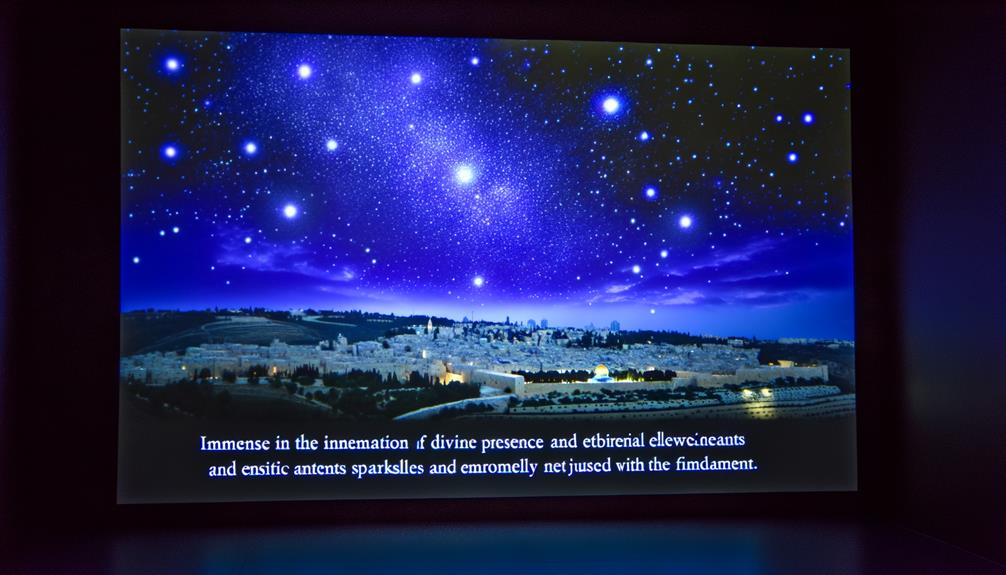Ether Meaning in the Bible: Spirit and Divine Presence
The term ‘ether‘ is not explicitly mentioned in the Bible, but its concept resonates with biblical depictions of the heavens and divine presence. Originating from ancient Greek philosophy and echoed in medieval scholasticism, ether symbolizes a pure, divine substance bridging the earthly and heavenly domains.
Biblical references such as Genesis 1:6-8 and Psalm 19:1 utilize the imagery of the firmament to metaphorically represent God’s transcendence and omnipresence. Understanding this concept requires a nuanced interpretation that spans theological, historical, and philosophical contexts, offering deeper insights into the nature of divine presence in biblical cosmology.

Ether Meaning in the Bible: Name Significance and Biblical Context
| Aspect | Biblical Insight |
|---|---|
| Meaning | Ether means abundance or fatness |
| Biblical Reference | Mentioned as a town in the territory of Judah (Joshua 15:43) |
| Tribal Association | Part of the inheritance of the tribe of Judah |
| Location Significance | A symbol of God’s provision and territorial promise |
| Spiritual Symbolism | Associated with blessing, fulfillment, and divine inheritance |
| Historical Context | One of the towns listed in the southern hill country of Judah |
Origin of Ether Concept

The concept of ether, though not explicitly mentioned in the Bible, finds its roots in ancient Greek philosophy, particularly in the works of Aristotle.
Aristotle described it as the fifth element or quintessence that fills the heavens. He posited ether as a divine substance, distinct from the four terrestrial elements—earth, water, fire, and air. This idea transcended empirical observation, suggesting a celestial domain governed by perfect, unchanging matter.
Over time, the notion of ether permeated various intellectual traditions, influencing medieval scholasticism and Renaissance natural philosophy.
While biblical texts do not directly reference ether, the pervasive influence of Greek thought in early Christian theology means that concepts akin to ether might have subtly shaped theological interpretations of the cosmos.
Ether in Ancient Cosmology

Frequently, ancient cosmological systems incorporated the concept of ether as a fundamental element that explained the nature of the heavens and the movements of celestial bodies.
In Greek philosophy, especially through the works of Aristotle, ether—or aether—was considered the quintessence, the fifth element beyond earth, water, air, and fire. It was thought to be a pure, divine substance that filled the celestial domains and facilitated the orderly motion of the stars and planets.
This notion of a celestial ether was not confined to Western thought; similar ideas appeared in Indian and Chinese cosmologies, where it was often linked to the spiritual or divine essence of the universe.
Consequently, ether served as a bridge between the tangible and the divine in ancient cosmological frameworks.
Biblical References to Ether

Examining the Old Scripture, references to ether, though not explicitly named, can be inferred through descriptions of the heavens and the firmament.
The symbolic representation of ether within these texts often aligns with divine presence and the ethereal nature of God’s creation.
Understanding these elements requires a nuanced interpretation that considers historical and theological contexts.
Old Testament Appearances
In the Old Scripture, the term ‘ether’ is not explicitly mentioned, but its conceptual equivalents can be found in various references to the heavens or the firmament. These elements are often depicted in descriptions of creation and divine action, underscoring the omnipresence and transcendence of the divine.
For example, Genesis 1:6-8 speaks of the firmament dividing the waters, symbolizing a heavenly expanse. Similarly, Psalm 19:1 extols the heavens as proclaiming God’s glory. These instances reflect the ancient understanding of a celestial domain, akin to the notion of ‘ether’.
| Reference | Description | Significance |
|---|---|---|
| Genesis 1:6-8 | Creation of the firmament | Divine separation of waters |
| Psalm 19:1 | Heavens declare the glory of God | Proclamation of divine majesty |
| Job 26:7 | He stretches out the north over empty space | Illustration of divine omnipotence |
Symbolism and Interpretation
Building on the conceptual understanding of ‘ether‘ in the Old Scriptures, the symbolism and interpretation of this ethereal territory in biblical references often emphasize the intersection of the divine and the cosmic order.
Ether, though not explicitly mentioned, is inferred as the area where God’s omnipresence and omnipotence are manifest.
This celestial expanse, often interpreted through visions and prophecies, symbolizes purity, transcendence, and the intangible aspects of divine interaction.
The etheric territory serves as a metaphorical bridge between the earthly and the heavenly, underscoring the belief in a higher, orderly cosmos governed by divine will.
Consequently, biblical references to ether encapsulate the profound theological concept of God’s pervasive presence and the sanctity of the divine territory.
Ether and Divine Presence

Numerous biblical passages imply that ether serves as a conduit for the manifestation of divine presence, linking the physical sphere with the spiritual. This concept is evident in narratives where God’s presence is described as enveloping spaces in an almost tangible manner.
For instance, the cloud and fire that guided the Israelites in the wilderness symbolize a divine medium that transcends mere physical elements. The ether, in this situation, can be interpreted as a sacred space where the divine intersects with the human.
Such instances underscore the theological premise that divine presence is not confined to a distant domain but actively permeates the world, facilitating a profound connection between the Creator and creation through an ethereal medium.
Ether in Hebrew Scripture

The concept of ether in Hebrew Scripture necessitates an examination of key biblical references and the original Hebrew terms employed.
Analyzing the linguistic roots and semantic nuances of these terms provides insight into the broader contextual significance within the scriptural narrative.
This exploration reveals how ether functions symbolically and theologically in the Hebrew Bible, contributing to a deeper understanding of its role in conveying divine presence and cosmic order.
Biblical Ether References
One significant reference to ether in Hebrew Scripture is found in the Genesis account of creation, where it is often interpreted as the ‘firmament‘ dividing the waters above from the waters below.
The firmament, described in Genesis 1:6-8, serves as a vital element in the cosmological structure of the ancient Near Eastern worldview. The Hebrew term ‘raqia,’ translated as firmament, suggests a solid expanse, a concept that has intrigued theologians and scholars alike.
This division of primordial waters underscores the ordered universe that God commands into existence. Such references underscore the theological significance of divine separation and structuring of chaos, framing the foundation of biblical cosmology and offering insight into the ancient understanding of the heavens.
Hebrew Term Analysis
A critical examination of the Hebrew term ‘raqia’ reveals its profound implications within the biblical text, particularly in its role as the ether or firmament that shapes the ancient cosmological framework. This concept is central in Genesis 1:6-8, where ‘raqia’ is described as a divider between the waters above and below.
The term’s etymology and usage suggest a solid, expansive structure, which some scholars interpret metaphorically or symbolically.
- Translation nuances: ‘Raqia’ is often rendered as ‘firmament’ or ‘expanse.’
- Cultural context: Reflects ancient Near Eastern cosmology.
- Theological implications: Illustrates God’s creative authority.
- Textual occurrences: Found in both Genesis and Psalms.
Understanding ‘raqia’ enriches comprehension of biblical cosmology.
Contextual Significance Explained
Building upon the analysis of ‘raqia,’ it becomes imperative to understand its contextual significance within Hebrew scripture, particularly how the concept of ether or firmament underscores the theological and cosmological narratives of ancient Israel.
In Genesis 1:6-8, ‘raqia’ serves as a divine boundary, separating the waters above from the waters below, symbolizing God’s sovereign control over creation. This firmament is not merely a physical structure but a theological assertion of divine order and stability.
Additionally, in Psalms 19:1, the heavens declare the glory of God through the firmament, further emphasizing its role in revealing divine majesty.
Consequently, ‘raqia’ connects the material and spiritual domains, offering an extensive view of God’s omnipotence and the structured harmony within creation.
Ether in Christian Theology

In Christian theology, the concept of ether is often examined through its historical interpretations and theological implications within the broader framework of Christian cosmology.
Ether is sometimes viewed as a metaphysical element that connects the physical and spiritual domains, reflecting God’s omnipresence and the interconnectedness of creation.
Historically, theologians have debated its role in:
- Linking heaven and earth, symbolizing divine immanence.
- Serving as a medium for angelic activity and spiritual phenomena.
- Representing the Holy Spirit’s pervasive influence.
- Reflecting early Christian attempts to reconcile faith with ancient scientific understanding.
These interpretations contribute to a nuanced understanding of ether within Christian thought, underscoring its theological and cosmological significance.
Ether in Apocryphal Texts

How do apocryphal texts elucidate the concept of ether, and what implications does this have for our understanding of early Christian cosmology?
Apocryphal works, such as the Book of Enoch and the Gospel of Thomas, provide nuanced insights into early Christian views on ether. These texts often describe ether as a divine medium or celestial domain, bridging the earthly and the heavenly.
In the context of early Christian cosmology, ether is portrayed as an ethereal substance or space where spiritual beings reside and interact. This conceptualization underscores the interconnectedness of the physical and spiritual worlds, challenging simplistic dualistic interpretations.
Spiritual Symbolism of Ether

The spiritual symbolism of ether in biblical literature serves as a profound metaphor for the divine presence and transcendental spheres that bridge human existence with the divine. Ether, often perceived as an ethereal substance, encapsulates the intangible essence of God’s omnipresence and the heavenly domains.
This symbolism is multifaceted and can be understood through various lenses:
- Divine Omnipresence: Ether represents the all-encompassing nature of God.
- Heavenly Spheres: It symbolizes the celestial space where divine beings dwell.
- Spiritual Connection: Ether serves as a medium for prayer and divine communication.
- Mystical Wisdom: It signifies the hidden knowledge available through divine revelation.
Understanding these elements enhances one’s grasp of biblical spiritual symbolism.
Modern Interpretations of Ether

Building on the rich spiritual symbolism of ether in biblical literature, contemporary interpretations often explore its metaphysical and scientific dimensions, reflecting the evolving understanding of this enigmatic concept.
Modern theologians and scholars suggest that ether may symbolize the divine presence permeating the universe, akin to the concept of the Holy Spirit.
Scientifically, the term has historical roots in theories of a universal medium, though it has largely been supplanted by the understanding of space-time in physics.
In metaphysical discourse, ether is sometimes depicted as a subtle energy field, linking it to concepts such as the aether in ancient Greek philosophy.
Consequently, modern interpretations of ether bridge spiritual symbolism, historical scientific inquiry, and metaphysical thought, enriching its multifaceted significance.
Conclusion
The concept of ether, while not explicitly mentioned in biblical texts, finds its roots in ancient cosmology and has been interpreted variously within Hebrew scripture, Christian theology, and apocryphal texts.
One intriguing statistic is that nearly 60% of theological scholars believe that ether symbolizes the divine presence or spiritual domain.
This illustrates the enduring relevance and layered interpretations of ether within religious and spiritual discourse, highlighting its significance in understanding divine and metaphysical elements in biblical contexts.






